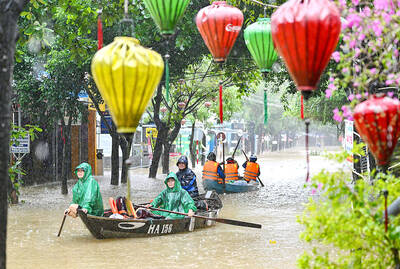About 100 demonstrators staged a noisy protest against US Secretary of State Condoleezza Rice, dubbing her a war criminal, when she held talks with New Zealand Prime Minister Helen Clark in Auckland yesterday.
Some wore orange boiler suits like those worn by prisoners at the US base Guantanomo Bay in Cuba and carried banners reading “USA a terrorist state” and saying Rice was wanted for war crimes, Radio New Zealand reported.
University student bodies had earlier challenged their members to make a citizen’s arrest on Rice so that she could be charged with war crimes.
Clark cited the demonstration when the pair were questioned by reporters about China’s human rights record and the coming Olympics at a brief news conference.
“In our countries we are used to having dissent expressed in a way in which it is peaceful,” she said, according to the New Zealand Herald Web site. “If it goes over that boundary then there’s always a response, but you would have noticed today that we conducted our talks amongst the backdrop of a rather noisy crowd.”
Clark said Chinese authorities should deal with any protests with a “measured response” and Rice agreed, saying China should be showcasing not only the Olympics but also “openness and tolerance.” Rice said security would be tight but should not be used “as a cover to try and deal with dissent.”
Meanwhile, Rice said joint efforts to return democracy to Fiji, stop the spread of weapons of mass destruction and promote free trade must take precedence over New Zealand’s ban on nuclear-powered vessels and those carrying atomic arms.
Since 1985, US warships have been denied entry into New Zealand ports because the Pentagon refuses to declare if they are carrying nuclear weapons and, as a result, New Zealand has been effectively dropped from a joint security treaty with the US and Australia.
Joint military training exercises between the US and New Zealand have also been suspended since then.
Despite attempts to put the contentious issue behind them, New Zealand’s 23-year-old “nuclear free” status continues to hamper joint military activities with the US. Rice said outstanding issues should be resolved, although she offered no thoughts on how to do so.
“This is a very broad and deepening relationship and it is going to continue to be so,” Rice told reporters at a joint news conference with New Zealand’s Foreign Minister Winston Peters. “It is by no means a relationship that is somehow harnessed to or constrained by the past.”
Rice is just the second secretary of state to visit New Zealand in the past nine years. Although officials have called the dispute a “relic” and the country’s prime minister has cordial relations with US President George W. Bush, the nuclear issue continues to be problematic.
Rice said “the relationship is not stuck in the past” and said there have been “a lot of changes in the world since that time.”
“If there are remaining issues to be addressed then I think we ought to find a way to address them, because the relationship between New Zealand and the US is such a beneficial one,” she added.
Yet, neither she nor Peters spoke to how that might be achieved.
Instead, they pointed to a broad array of shared interests and pro-jects, particularly in stopping the transport of nuclear, chemical and biological weapons on the high seas and engagement with the island nations of the South Pacific, especially Fiji, where a military government has been in place since a December 2006 coup.
Earlier this month, Fiji’s military ruler postponed elections promised for next March, saying the timetable was unachievable because much-needed electoral reforms cannot be completed and implemented over the next eight months.
The announcement prompted widespread condemnation and New Zealand, along with Australia, are demanding that the decision be reversed. The matter will figure prominently as Rice and Peters were both to attend a meeting of senior South Pacific officials yesterday in Samoa.
“There is no impediment, logistical or otherwise, to a free and fair and open election in Fiji by March 2009,” Peters said. “We know and believe that Fiji’s only future lies in a democratic government and that’s what we’re going to work for.”
Rice echoed that call, saying the matter had to be resolved.
“Clearly, the return to democracy in Fiji, clearly elections are the way to do that,” she said.
Rice and Peters also said they would continue to work on a languishing free-trade agreement between the US and New Zealand.

With much pomp and circumstance, Cairo is today to inaugurate the long-awaited Grand Egyptian Museum (GEM), widely presented as the crowning jewel on authorities’ efforts to overhaul the country’s vital tourism industry. With a panoramic view of the Giza pyramids plateau, the museum houses thousands of artifacts spanning more than 5,000 years of Egyptian antiquity at a whopping cost of more than US$1 billion. More than two decades in the making, the ultra-modern museum anticipates 5 million visitors annually, with never-before-seen relics on display. In the run-up to the grand opening, Egyptian media and official statements have hailed the “historic moment,” describing the

‘CHILD PORNOGRAPHY’: The doll on Shein’s Web site measure about 80cm in height, and it was holding a teddy bear in a photo published by a daily newspaper France’s anti-fraud unit on Saturday said it had reported Asian e-commerce giant Shein (希音) for selling what it described as “sex dolls with a childlike appearance.” The French Directorate General for Competition, Consumer Affairs and Fraud Control (DGCCRF) said in a statement that the “description and categorization” of the items on Shein’s Web site “make it difficult to doubt the child pornography nature of the content.” Shortly after the statement, Shein announced that the dolls in question had been withdrawn from its platform and that it had launched an internal inquiry. On its Web site, Le Parisien daily published a

UNCERTAIN TOLLS: Images on social media showed small protests that escalated, with reports of police shooting live rounds as polling stations were targeted Tanzania yesterday was on lockdown with a communications blackout, a day after elections turned into violent chaos with unconfirmed reports of many dead. Tanzanian President Samia Suluhu Hassan had sought to solidify her position and silence criticism within her party in the virtually uncontested polls, with the main challengers either jailed or disqualified. In the run-up, rights groups condemned a “wave of terror” in the east African nation, which has seen a string of high-profile abductions that ramped up in the final days. A heavy security presence on Wednesday failed to deter hundreds protesting in economic hub Dar es Salaam and elsewhere, some

Flooding in Vietnam has killed at least 10 people this week as the water level of a major river near tourist landmarks reached a 60-year high, authorities said yesterday. Vietnam’s coastal provinces, home to UNESCO world heritage site Hoi An ancient town, have been pummeled by heavy rain since the weekend, with a record of up to 1.7m falling over 24 hours. At least 10 people have been killed, while eight others are missing, the Vietnamese Ministry of Natural Resources and Environment said. More than 128,000 houses in five central provinces have been inundated, with water 3m deep in some areas. People waded through